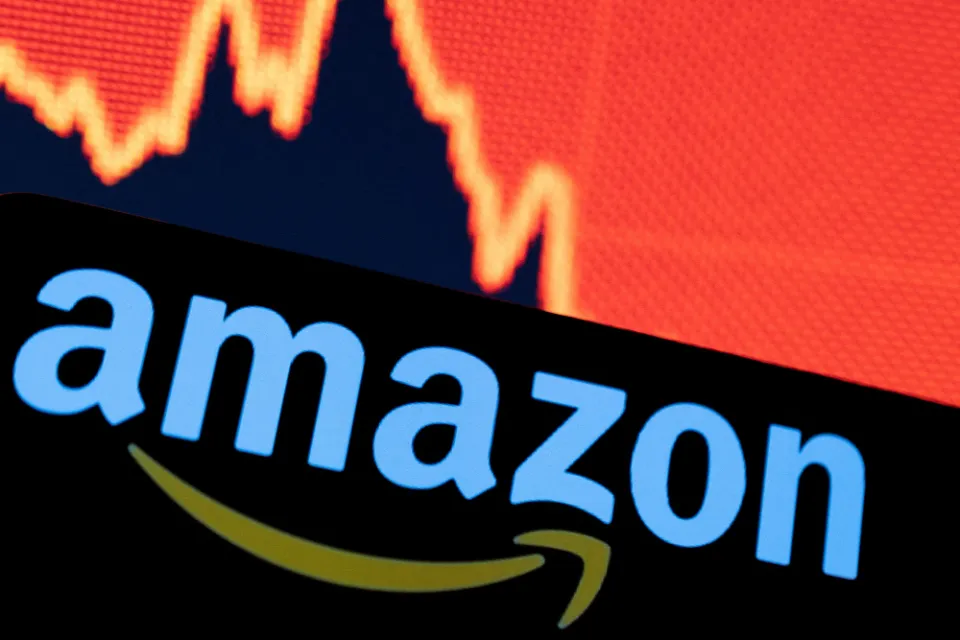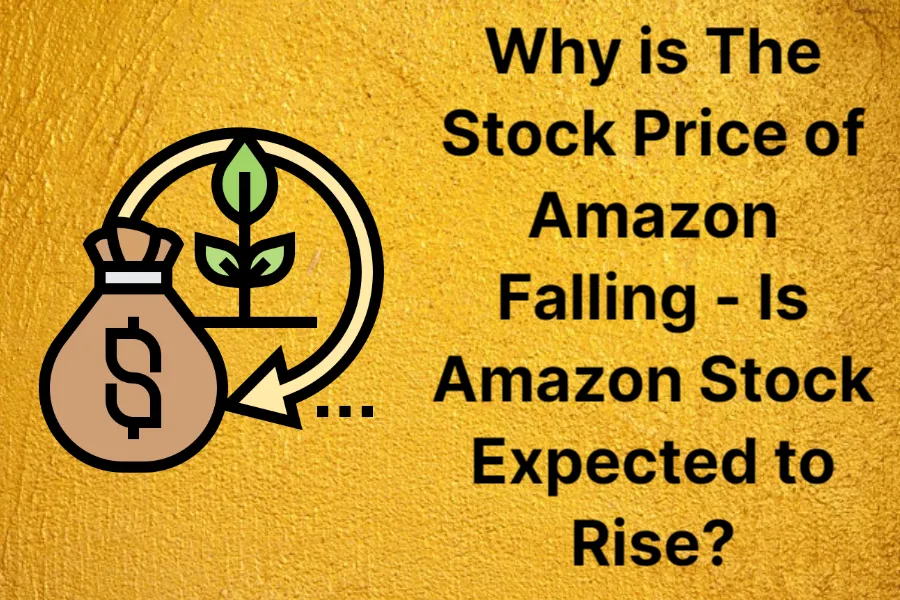Following a hiring binge during the Covid-19 pandemic, Amazon is reducing its employee base. By the end of 2021, there were over 1.6 million employees working for the company worldwide. This is more than the 798,000 reported in the fourth quarter of 2019.
The Nasdaq 100, which is heavily weighted toward technology, and the share prices of technology companies both have a relationship with stock valuations. Amazon is a perfect example of how valuations change as the underlying parameters do, and vice versa.
Downsides to Consider before Investing in Amazon Stock

While Amazon has been a hugely successful company with a skyrocketing stock price, there are still some risks and downsides to consider before investing in Amazon stock. Here are some factors to consider:
- High Valuation: Amazon’s stock is currently trading at a high valuation, which means that the stock is relatively expensive compared to its earnings. If the company does not continue to meet high growth expectations, the stock may become overpriced and vulnerable to a sharp decline.
- Intense Competition: Amazon operates in highly competitive industries such as retail, cloud computing, and streaming services. The company faces strong competition from established players like Walmart, Google, and Netflix, as well as new entrants. This competition could affect Amazon’s market share and revenue growth.
- Regulatory Risks: As one of the largest tech companies in the world, Amazon is subject to increasing scrutiny and regulation from governments around the world. Any new regulations or antitrust actions could negatively impact Amazon’s business.
- Dependence on Key Personnel: Amazon’s success has been largely driven by its founder and CEO, Jeff Bezos, who stepped down from his role in 2021. The company’s success will now depend on the leadership and decision-making of his successor, Andy Jassy. Any missteps by the new leadership could have a significant impact on Amazon’s business.
- Operational Risks: Amazon’s vast logistics network and supply chain are essential to its business. Any operational issues, such as warehouse or delivery problems, could negatively impact the company’s reputation and financial performance.
In conclusion, while Amazon has been a highly successful company, potential investors should carefully consider the risks and downsides before investing in its stock.
Is Amazon a Good Long-Term Investment?
Amazon has been a good long-term investment for many investors, but whether it will continue to be a good investment in the future depends on various factors. Here are some things to consider when assessing whether Amazon is a good long-term investment:
- Market position: Amazon is a dominant player in various industries, including e-commerce, cloud computing, and digital streaming. Its market position gives it a competitive advantage that could help it maintain its growth trajectory over the long term.
- Innovation: Amazon has a track record of innovation, constantly introducing new products and services to stay ahead of the curve. Its investment in cutting-edge technology, such as artificial intelligence and robotics, could further propel the company’s growth over the long term.
- Financial performance: Amazon has consistently delivered strong financial performance, with steady revenue growth and a profitable business model. Its strong cash flow allows it to invest in new ventures and return capital to shareholders.
- Risks and challenges: While Amazon’s growth prospects are promising, there are risks and challenges to consider. These include regulatory risks, operational risks, and increasing competition in various industries.
- Valuation: As mentioned earlier, Amazon’s stock is currently trading at a high valuation. This could make it vulnerable to a sharp decline if the company fails to meet growth expectations.
In conclusion, Amazon has been a good long-term investment for many investors, and its market position, innovation, and financial performance make it a promising investment for the future. However, investors should carefully consider the risks and challenges before investing, and should be mindful of the stock’s valuation.
The Bull Case for Amazon
The bull case for Amazon is based on several factors that suggest the company is well-positioned for growth and has the potential to deliver strong returns for investors. Here are some of the key points in the bull case for Amazon:

- E-commerce Dominance: Amazon is the dominant player in the e-commerce industry, with a market share of over 40% in the US. As more consumers shift to online shopping, Amazon is well-positioned to benefit from this trend.
- Cloud Computing Growth: Amazon Web Services (AWS) is the market leader in cloud computing, with a market share of over 30%. As more businesses move their operations to the cloud, AWS is poised for continued growth.
- Advertising Business: Amazon’s advertising business has been growing rapidly in recent years, with revenues surpassing $21 billion in 2020. As more consumers shop online, advertisers are increasingly turning to Amazon to reach their target audience.
- Expansion into Healthcare: Amazon’s entry into the healthcare industry through its acquisition of PillPack and partnership with Berkshire Hathaway and JPMorgan Chase has the potential to disrupt the healthcare industry and create new growth opportunities for the company.
- Innovation: Amazon has a track record of innovation, and has invested heavily in new technologies like artificial intelligence, machine learning, and robotics. This could give the company a competitive edge in the years to come.
- Strong Financial Performance: Amazon has consistently delivered strong financial performance, with revenue growth averaging over 20% annually over the past five years. The company has also been profitable in recent years, generating over $21 billion in net income in 2020.
In conclusion, the bull case for Amazon is based on the company’s dominant market position in e-commerce and cloud computing, growing advertising business, expansion into healthcare, innovation, and strong financial performance. While there are risks and challenges to consider, many investors believe that Amazon has the potential to continue delivering strong returns over the long term.
The Bear Case for Amazon
The bear case for Amazon is based on several factors that suggest the company may face challenges that could negatively impact its growth prospects and financial performance. Here are some of the key points in the bear case for Amazon:
- Increasing Competition: Amazon faces intense competition in its various business segments, including e-commerce, cloud computing, and digital advertising. As competition intensifies, Amazon may struggle to maintain its market share and revenue growth.
- Regulatory Risks: Amazon is subject to increasing regulatory scrutiny, particularly in the areas of antitrust and data privacy. Any new regulations or antitrust actions could negatively impact Amazon’s business and financial performance.
- Dependence on Key Personnel: Amazon’s success has been largely driven by its founder and former CEO, Jeff Bezos, who stepped down from his role in 2021. The company’s success will now depend on the leadership and decision-making of his successor, Andy Jassy. Any missteps by the new leadership could have a significant impact on Amazon’s business.
- Valuation: Amazon’s stock is currently trading at a high valuation, which makes it vulnerable to a sharp decline if the company fails to meet growth expectations. This could be a risk if the company experiences any significant setbacks or if its growth slows down.
- Operational Risks: Amazon’s vast logistics network and supply chain are essential to its business. Any operational issues, such as warehouse or delivery problems, could negatively impact the company’s reputation and financial performance.
In conclusion, the bear case for Amazon suggests that the company may face challenges in the form of increasing competition, regulatory risks, dependence on key personnel, high valuation, and operational risks. While these factors do not necessarily guarantee that Amazon will experience significant problems in the future, they do suggest that the company’s growth prospects and financial performance may face headwinds in the years to come.

Is Amazon a Buy, Hold Or Sell?
As a general principle, the decision to buy, hold or sell Amazon stock depends on individual investors’ financial goals, risk tolerance, and investment horizon. Investors should conduct thorough research and analysis of the company’s fundamentals, industry trends, and other relevant factors before making any investment decisions. It is also important to keep in mind that the stock market can be volatile, and past performance does not guarantee future results. As with any investment, it is important to diversify and invest based on a well-thought-out investment strategy. It is recommended that investors consult with a financial advisor before making any investment decisions.
FAQs
Is Amazon a Good Stock to Buy?
Amazon is one of the largest and most successful companies in the world, with a market capitalization of over $1 trillion. The company has a strong track record of revenue growth and profitability, driven by its dominant position in the e-commerce industry, leadership in cloud computing, and growing digital advertising business.
However, as with any investment, there are risks to consider. Amazon faces intense competition in all of its business segments, and its success depends on its ability to continue innovating and adapting to changing market conditions. The company also faces regulatory risks, particularly in the areas of antitrust and data privacy.
Before deciding whether to invest in Amazon, it is important to conduct thorough research and analysis of the company’s fundamentals, industry trends, and other relevant factors. Investors should also consider their financial goals, risk tolerance, and investment horizon. It is recommended that investors consult with a financial advisor before making any investment decisions.
In summary, Amazon is a well-established and successful company with strong growth prospects, but as with any investment, it is important to carefully weigh the risks and potential rewards before making a decision.
Should I Invest in Amazon Stock?
Before deciding whether to invest in Amazon, it is important to consider several factors, such as:
- Your financial goals: What are you trying to achieve by investing in Amazon? Are you looking for long-term growth or short-term gains? Your financial goals will help you determine whether Amazon is a good fit for your investment portfolio.
- Risk tolerance: Amazon’s stock can be volatile, and its value can fluctuate significantly based on market conditions, competition, and other factors. Consider your risk tolerance and ability to withstand potential losses.
- Market conditions: The stock market can be unpredictable, and investors should be aware of broader market conditions and trends that may impact Amazon’s stock price.
- Company fundamentals: Consider Amazon’s financial performance, industry trends, competitive landscape, and any regulatory risks that may impact its future growth prospects.
- Valuation: Amazon’s stock is currently trading at a high valuation, which means that it may be expensive relative to its earnings and other fundamental metrics. Consider whether the stock is priced appropriately for its growth potential.
Ultimately, the decision to invest in Amazon or any other stock should be based on careful research, analysis, and a well-thought-out investment strategy. It is recommended that investors consult with a financial advisor before making any investment decisions.



